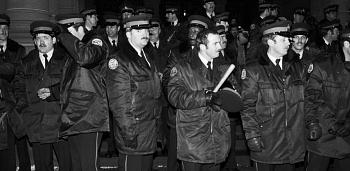Canadian police chiefs apologize for opposing the decriminalization of homosexuality
Canada's police chiefs are apologizing to LGBTQ communities for their opposition to decriminalizing homosexuality in the late 1960s.
The Canadian Association of Chiefs of Police made the formal apology in a statement issued online Thursday.
Chief Bryan Larkin, president of the association, said it was the culmination of two years of research and consultation after a member of the organization pointed out that the group publicly opposed amending the Criminal Code to decriminalize homosexuality in 1968.
"We felt on the International Day of Human Rights this year was the right opportunity for us to make the apology, to reconcile our past, and to begin the healing process moving forward," Larkin said in an interview.
The lengthy apology said police continued to criminalize members of sexual and gender diverse communities even after homosexuality was decriminalized by the federal government.
"We acknowledge the pain our actions have caused, the personal suffering, shame and trauma our public positions contributed to, and the deep distrust and divide that was created by the positions we took," the statement, signed by Larkin, said.
"We take responsibility for our past wrongdoings and, on behalf of the Canadian Association of Chiefs of Police, I am sorry."
The association said it's also releasing a "tool kit" offering specific guidelines, best practices, and recommendations for Canada's 194 police forces on how to best deal with LGBTQ communities.
"We just felt an apology without action, an apology without a future direction, an apology without a strong commitment to making amends, wasn't enough for us to reconcile with the 2SLGBTQ+ community," Larkin said in the interview.
Tom Hooper, a historian at York University who has written extensively about the relationship between Canada's LGBTQ communities and police said he feels the police chiefs didn't consult enough with the affected communities.
"They've initiated the apology, this apology is occurring on their terms," said Hooper. "I'm not entirely sure who it's directed at or what it is we're supposed to do with it."




